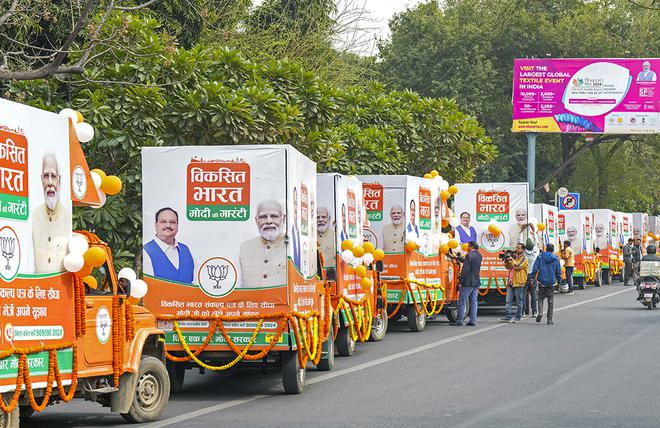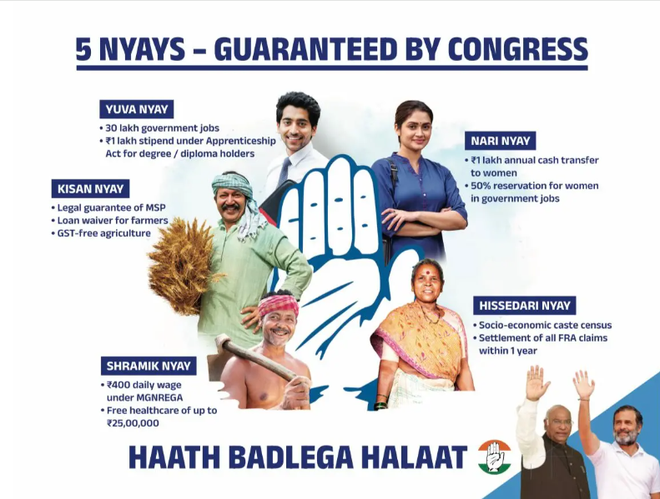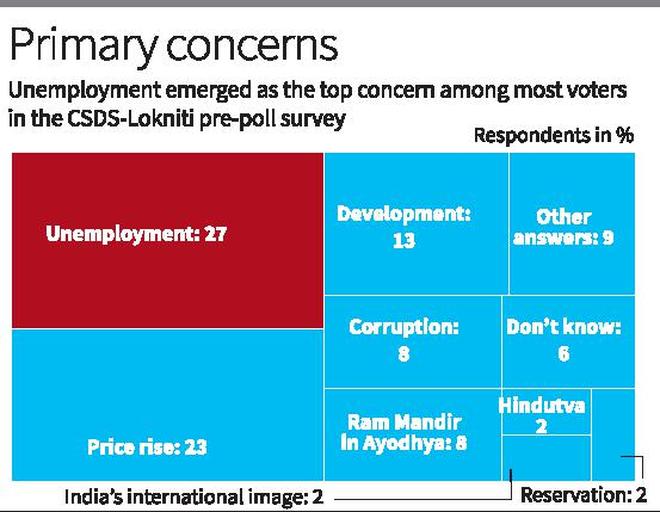The story so far: With the polling for the 2024 Lok Sabha elections halfway complete, the Aam Aadmi Party (AAP) is the latest to unroll its ‘guarantees’ to voters if elected to power. A day after AAP chief Arvind Kejriwal was released on interim bail from Tihar Jail, he swung into campaign mode, attacking his chief contender — Prime Minister Narendra Modi, urging people to vote against ‘dictatorship.’
As of date, three national parties — the BJP, Congress and AAP — have issued a list of ‘guarantees’ targetting different strata of society, detailing schemes and freebies it would dole out if elected to power. The concept of listing ‘guarantees’ most recently proved successful during the Congress campaigns in Telangana and Karnataka in 2023. Prior to this, AAP had also rolled a slew of ‘promises’ targeting different occupational communities during the 2021 State elections in Goa, Uttarakhand, Uttar Pradesh, and Punjab.
Here’s a look at the three lists of “guarantees” and what electoral issues they seek to address.
BJP: Modi ki guarantee
Making an early headstart, the ruling party was the first to unveil its set of ‘guarantees’ in February, titled ‘Modi ki guarantee’ for a ‘Viksit Bharat’ (developed India) by 2047. Unlike the Opposition parties, BJP’s ‘guarantees’ are a promise to take ahead existing schemes of the Modi government. No major new policies or announcements have been made as an aim for the next term.

Listing its achievements over the two Modi terms in welfare, development, restoring the glory of cultural heritage, youth, farmer and women empowerment, middle class gain, economic growth, digital infrastructure, J&K integration and foreign policy, BJP claims that a ‘Modi guarantee’ means a ‘guarantee which will be fulfilled.’ It asserts that by following this holistic approach, India will be on track to achieve developed status by 2047.
Here is an overview of Modi ki guarantees:
Welfare guaranteed: Ensuring saturation of government schemes to provide housing, health insurance, electricity, food grains and drinking water to all
Empowering Annadatas: Continuation of uninterrupted credit access, focus on ethanol blending, farm-assistance via crop insurance and minimum income support
Nari Shakti: Access to bank accounts for women, loans to women-led businesses, creating women millionaires, free cooking gas connection, and an emphasis on women education
Vikas bhi Virasat bhi: Developing cultural sites like Varanasi and Ujjain, and making Ayodhya the ‘spiritual capital of the world’ with the Ram Mandir at its centre. Reclaiming Indian antiquities from across the world and addition of Indian sites to UNSECO’s World Heritage List to celebrate India’s cultural traditions as well as contemporary aspirations.
Promising ecosystem for Amrit Peedhi: Creating jobs via credit access to young entrepreneurs, establishing labs for projects aimed at solving society’s issues, emphasis on digital literacy, higher education enrollment and implementation of the National Education Policy 2020.
Middle class emerges winner: Developing India’s metro network and Vande Bharat trains, continuing tax cuts and affordable housing, and basic infrastructure projects in urban areas to aid middle class citizens.
Indian economy: Increase in Goods and Services Tax (GST) revenue, export goods, and growth of Medium, Small and Micro enterprise (MSME) sector to make India the world’s third largest economy.
Digital India: Global deployment of India’s digital payments platform – Unified Payments Interface (UPI), nationwide 5G deployment, and focus on supercomputing and digital health
Abrogation of Article 370: Reducing terror incidents and civilian deaths in Jammu-Kashmir, increased industrial growth, investments, innovation and tourism in the Valley post abrogation of Article 370 and revoking J&K’s special status.
Bharat A Vishwamitra in Making: Elevating India’s stature to new heights via foreign policy agreements like the New Delhi G20 Declaration, Vaccine Maitri and seeking permanent membership in the UN Security Council.
As the BJP’s poll campaign gets sharper, Mr. Modi has announced five new guarantees in a West Bengal rally— no religion-based reservations, no alteration to SC/ST/OBC reservation, no ban on Ram Navami celebrations, no quashing of the Ram Janmabhoomi Supreme Court verdict, and no stay on the implementation of the Citizenship Amendment Act (CAA).
Congress: Paanch Nyay (5 Justices)
Building on the Bharat Jodo Nyay Yatra led by Rahul Gandhi, Congress rolled out its manifesto titled ‘Nyay Patra’ along with a ‘Paanch Nyay’ list detailing twenty-five guarantees it will fulfill if voted to power. Focusing on youth, women, farmers, labourers and marginalised communities, Congress’ guarantees offer many new policy changes, meet popular demands like a legal guarantee for MSP, removal of the cap on reservation, farm loan waiver and a nationwide caste census.

Notably, it has not expressly promised to repeal any of the laws passed by the Modi government, including abrogation of Article 370, the GST Bill, and the amendments to the Government of National Capital Territory of Delhi (GNCTD) law — all of which the party opposed in Parliament. Curiously, reverting to the old pension scheme — an issue which the party raised vociferously during the Rajasthan, Chhattisgarh and Madhya Pradesh State polls, has also not featured in the ‘guarantees.’
Following are the five sets of ‘Nyay’ promised by Congress:
Yuva Nyay (Justice for youth): Assurance of 30 lakh new central government jobs, a scheme offering a one-year internship to all educated youth, stringent laws to eliminate exam paper leaks, social security for gig workers and allocating Rs. 5000 crores for start-ups
Nari Nyay (Justice for women): Mahalakshmi scheme offering Rs 1 lakh per year to poor women, 50% reservation for women in central government jobs, double central contribution to ASHA, Anganwadi, and Mid-Day Meal workers’ salaries, establishing legal advisors for women in every village, and doubling of existing women’s hostels (Savitribai Phule Hostels).
Kisaan Nyay (Justice for farmers): Legal guarantee of Minimum Support Price (MSP) for crops, establish a Standing Loan Waiver Commission to systematically evaluate and recommend debt waivers, guaranteed insurance payment within 30 days of crop loss, import-export policy favouring farmers, and no GST on farming essentials
Shramik Nyay (Justice to labourers): Universal healthcare coverage for all, national minimum wage of Rs. 400, Employment Guarantee Act for urban regions, life and accident insurance schemes for unorganised workers, and halting contractualisation in core government functions
Hissedari Nyay (Justice to marginalised communities): Comprehensive social, economic and caste census, removing 50% cap on reservations, special budget for SC/ST communities, settlement of claims under the Forest Rights Act within one year, and notifying populous Scheduled Tribal areas as Scheduled Areas.
Apart from these guarantees, Rahul Gandhi has promised to waive off educational loans including unpaid interest until March 15 this year and waive off exam fees for government exams. In rallies, Mr. Gandhi and his sister Priyanka Gandhi Vadra have also promised to provide ten kilos of food grains every month to BPL (below poverty line) families and cashless medical treatment insured up to Rs 25 lakhs.
AAP: Kejriwal ki 10 Guarantee
Following the Delhi model of governance, AAP has released its list of ten guarantees it will fulfill if voted to power in the Centre. Similar to his pre-poll campaign in Delhi and Punjab, Mr. Kejriwal has promised free power, education, healthcare and two crore jobs. On a macro-policy level, he has promised full statehood to Delhi, the retrieval of Indian lands ‘annexed’ by China, offered MSP for crops as recommended by the Swaminathan Commission, promised removal of corruption from the roots and said he will scrap the Agniveer scheme.
The ‘guarantees’ do not mention any dole-outs to women as promised by the party in most State election campaigns. They also do not mention a pan-India caste census, an anti-paper leak law or even the repeal of the amended GNCTD law – a Bill the party opposed vehemently in the Parliament.
Moreover, Mr. Kejriwal said that he had not discussed the guarantees with his allies but assured the public that they would have no objections to it, as it would lay the foundation for a “new India.” Affirming that he did not wish to be India’s Prime Minister, he said, “If the INDIA bloc comes to power, I will ensure that these (guarantees) will be implemented on a war footing”.
List of Kejriwal’s guarantees:
- Uninterrupted power supply and free electricity to poor citizens
- Establishing world-class schools across India to impart free education
- Full freedom to the Indian Army to capture lands ‘annexed’ by China
- Scrapping Agniveer Scheme and implementing old recruitment process in Army
- Two crore jobs in one year
- Full statehood to Delhi
- Purchase of crops at MSP
- Eradication of corruption
- Free healthcare to all, establishing mohalla clinics in every locality and a multi-speciality hospital in every district
- Exclusion of GST from money-laundering offences
The above ‘guarantees’ are in addition to a detailed manifesto which both Congress and BJP have released. AAP, which is fighting on only 22 seats, has not issued any such manifesto.
What issues are people voting for?
As per a pre-poll survey by Lokniti-CSDS, unemployment and price rise were the key concerns of nearly half the citizens. 62% of those surveyed mentioned that getting jobs has become more difficult in the past five years, while 72% fell that prices have risen in the same time period. Both State and central governments have been held responsible by 57% for the dearth of jobs.
Another issue plaguing the electorate is rising corruption. 55% of people surveyed felt it had increased since 2019 while 19% said it had decreased. The Centre was blamed by 25% as compared to the states (19%) while 56% blamed both for the rise in corruption. Class divide has also increased starkly in India, Lokniti found.

Poorer respondents felt that it more difficult to have their needs met and save money now than five years ago. The percentage of those who felt this way was lower among respondents with higher financial income. A greater number of rich respondents felt that their standard of living was better now than in 2019, while half of the poor people surveyed felt they were worse off now.
Other findings of the survey were that more people feel that the development activities of the government favour only the rich, and that rural distress and farmers woes are real.
Which of these issues are tackled by the guarantees?
Both Congress and AAP’s guarantees tackle the issue of unemployment head on by promising immediate recruitment of youth in central jobs. BJP’s guarantees make an indirect pitch, assuring increased funding to start-ups, funding for setting up innovation labs, and more domestic and foreign investment in manufacturing, claiming this will provide for more job opportunities.
Inflation is not really addressed by any of these guarantees in terms of lowering the price of commodities or boosting consumer demand. Recognising some basic needs of citizens, all three guarantees promise free healthcare. While the BJP promises free rations, gas connections, tapped water, affordable housing and subsidised electricity via solar panels, AAP assures free power to the poor and free education.
Tackling corruption, AAP has vowed to “eradicate it from the root,” while BJP has re-iterated its zero-tolerance policy. Congress’ guarantees address another voter concern — the class divide. Apart from a caste census, Congress has promised a comprehensive social and economic census to address the needs of marginalized communities.
Farmer distress is addressed by the three parties in varied manners. BJP has promised to continue and expand its farm-related schemes on credit access, loans, millets, income support, incentive-linked farming, and MSP for crops, while AAP has promised to pay MSP for crops as per the Swaminathan Commission. Going a step further, Congress has promised a farm loan waiver, guaranteed crop insurance payment within 30 days and exempting essential farming goods from GST.
Whom do people trust?
Voters reportedly believe in Modi’s guarantees (23%) more than Rahul Gandhi’s (17%), giving the BJP a slight edge in the elections, reveals Lokniti. Further analysis shows that trust in Modi’s guarantees was higher among the middle-aged and older citizens as compared to young and working voters.
Among rural voters, Modi’s guarantees enjoyed higher trust in villages as compared to cities. Among the upper middle-class, Modi’s guarantees enjoy an 18% trust gain compared to Rahul Gandhi’s list. It is among middle-class voters, town-dwellers and college-educated voters where the trust gap between the two guarantees is the least.







